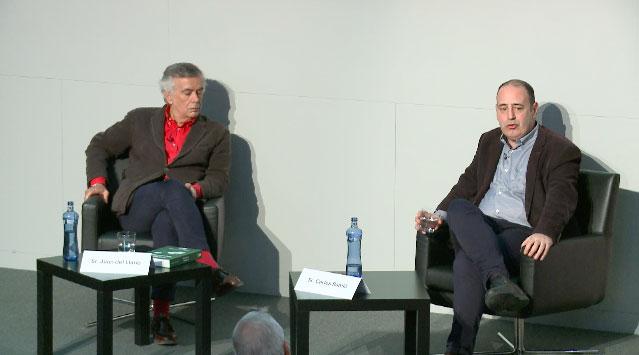
- About UPF-BSM
- Programs
- Faculty and research
- Companies and Organizations
- News & Events
Society Between Pandemics: 800 Pages of Addictive Analysis
17 Marzo - 2021
The UPF Barcelona School of Management has welcomed in its auditorium the presentation of the book Society between pandemics , which collects the analysis and opinions on the impact of the covid-19 pandemic by some of the most relevant national and international thinkers, experts and researchers to celebrate the 25 years of the Gaspar Casal Foundation.
Its objective is to create an open, critical and constructive dialogue with the will to become a point of reference for political actors, economic and social. The authors hope that the reflections that form Society Between Pandemics will help us better understand the society in which we will have to live from now on.
" The book is material for reflection in the medium term, slow, away from short-term and with a broad, multidisciplinary vision "
Jaume Puig-Junoy, Distinguished Professor at UPF Barcelona School of Management, has welcomed the event: "This is a rather special book, an effort by two editors but a team effort, the effort of 48 authors, some of them UPF professors. It is material for reflection in the medium term, slow, away from the short-term and with a broad, multidisciplinary vision. There are chapters dedicated to history, geopolitics, environment, education ... it is a very varied book. A very ambitious vision. "
He has continued to present Juan del Llano , director of the Gaspar Casal Foundation and co-editor of Society Between Pandemics. "I apologize for the thickness of the book, it is almost 800 pages, but it has been a great job," said del Llano.
Del Llano spoke with Carles Ramió , commissioner for the Strategy of the UPF group and Professor of Political Science and Administration at Pompeu Fabra University. Ramió has analyzed how to reinvent the bureaucracy, the subject on which he has written in the book.
"The public administration in this country is entering a crucial decade, because we have five elements on the agenda of great importance . If the administration can face them, it can be relaunched. If it does not, it will fall into decline ", he warned.
- Postcovid management: now comes the most difficult, the effects of the pandemic in a very vulnerable society and a very sensitive economy, a stressed labor market and great social inequalities.
- The SDGs: attend to planetary well-being, attend the needs of the planet is also a challenge in developed countries.
- The aging of the population: in the next 25 years in the case of Spain will be an extra cost of health up to 13% of GDP. We are now at 120% of GDP debt. This challenge will be very difficult to meet.
- Incorporation of emerging technologies: the administration has to incorporate AI and robotics.
- The Public employees are very old: We have between 2.5 and 3.3 million public employees. The average is 56 years old, it is a very old staff. In the next few years, a million civil servants will retire and they will surely be the founders of the public administration, the CCAA, the city councils, those who dominate the formal and informal rules. 80% of the management positions in the administration will be retiring soon. And this knowledge is likely to be lost. Seniors have intuitions (expert knowledge) and transferring it is very difficult. At the same time it is a great opportunity to attract fully digitized young talent.
Ramió, quoting Daron Acemoğlu and James A. Robinson, affirms that "if we do not solve these challenges, the State will be powerless, irresponsible". The public administration provides services, yes, but it also provides progress: "The problem is that the bureaucratic model works badly. Now, AI and robotics are a great opportunity to regenerate it", he has affirmed. The expert has ruled that "in a hundred years we can achieve an effective and efficient bureaucratic model without bureaucrats".
With AI and robotics "Mariano Rajoy will be out of work again, notaries, auditors, financial audits, they will become obsolete"
"Humans make mistakes, we have feelings and goals. Robots don't," he stressed. The automation of the administration will make the property registrars disappear and "Mariano Rajoy will be out of work again, notaries, auditors, financial audits, they will become obsolete." The problem will be to find a governance model: "And there is a lack of political motivation".
"We are risking the conceptual survival of the administration," he warned.
The closing of the act has gone by Vicente Ortún , Emeritus Professor of Economics and Business at Pompeu Fabra University. Ortún recalled that "today we celebrate 25 years of the Gaspar Casal Foundation by presenting a book that shows the collaboration with UPF and in a changing environment".
This book is slow and thoughtful, but it has a drawback ... it is an addictive book
Gaspar Casal was a doctor from Girona who studied Asturian leprosy, on the website of his foundation you can see the "great work of dissemination that he does with more than 90 books, training, programs, etc. an excellent career. The 25 years are celebrated with a book with well-known authors, but I also want to value the less well-known ones, such as Lino Camprubí , who is counting on the one who would be the Nobel Prize for research. This book is slow and thoughtful, but it has a drawback... It is an addictive book, "he concluded.